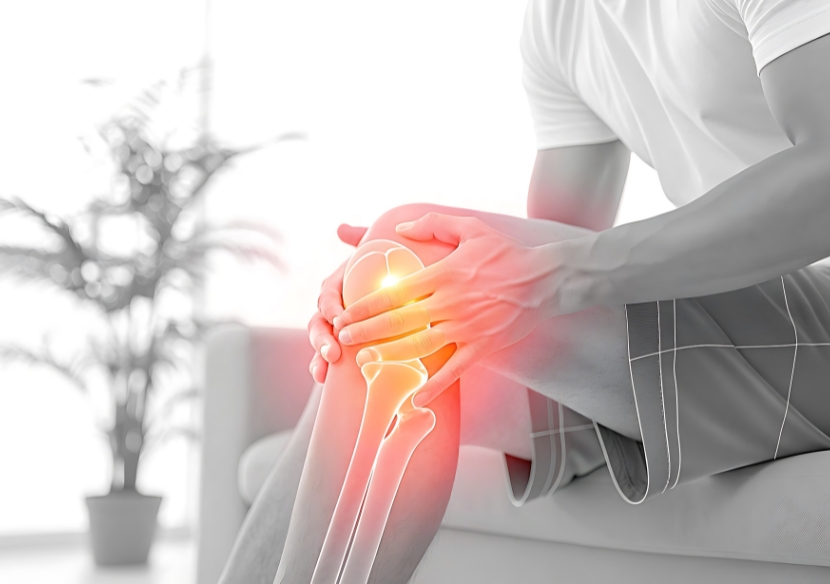Knee swelling is a common issue that can happen after an injury, due to arthritis, or from general overuse. It can make daily activities challenging, whether it’s walking, climbing stairs, or even sitting for long periods. If you’re wondering how to reduce swelling in knee quickly, the good news is there are several safe and effective approaches you can try at home and with medical support.
Let’s go through some practical methods, medical treatments, and lifestyle tips to reduce knee swelling and inflammation.
What Causes Knee Swelling?
Knee swelling can occur due to multiple reasons, such as:
- Sports injuries (ligament tears, meniscus damage)
- Osteoarthritis or rheumatoid arthritis
- Bursitis or tendonitis
- Excessive physical strain
- Medical conditions like gout or infection
Sometimes, people also notice inner knee swelling with no pain, which may not seem serious but should still be evaluated to rule out underlying causes.
Effective Home Remedies for Knee Swelling
1. R.I.C.E Method (Rest, Ice, Compression, Elevation): This is the most widely recommended approach for immediate relief:
- Rest: Avoid activities that put strain on the knee.
- Ice: Apply a cold pack for 15–20 minutes several times a day.
- Compression: Use an elastic bandage to control swelling.
- Elevation: Keep your knee raised above heart level.
2. Over-the-Counter Pain Relief: Non-steroidal anti-inflammatory drugs (NSAIDs) like ibuprofen can help manage swelling and discomfort. Always consult a doctor before prolonged use.
3. Gentle Exercises and Stretching: Once swelling decreases, low-impact exercises like swimming or cycling can help strengthen muscles and prevent stiffness.
4. Warm Compress (After Initial Swelling Reduces): After the first 48 hours, using a warm compress or heating pad can help improve blood circulation, reduce stiffness, and promote faster healing.
Tip: Always use heat therapy only after swelling has subsided, not during the acute phase.
5. Maintain a Healthy Weight: Extra body weight increases pressure on the knee joint and may worsen swelling. Adopting a balanced diet and maintaining a healthy weight can help reduce strain and aid recovery.
6. Stay Hydrated: Proper hydration helps reduce inflammation and flush out toxins from the body. Drinking enough water daily can support joint health.
7. Epsom Salt Soak: Soaking the swollen knee in warm water mixed with Epsom salt may ease discomfort. Magnesium in the salt can help relax muscles and reduce inflammation naturally.
8. Turmeric and Ginger Remedies: Both turmeric and ginger contain natural anti-inflammatory properties. Adding them to your diet (tea, soups, or as supplements with doctor’s advice) may support long-term joint health.
Sometimes, knee swelling may also be linked to other musculoskeletal conditions. Treatments like reverse shoulder surgery or wrist fracture surgery show how orthopaedic specialists manage different joint-related problems with precision.
Medical Treatments for Persistent Swelling
If swelling doesn’t go away, medical evaluation is essential. Depending on the condition, treatments may include:
- Corticosteroid injections
- Draining fluid from the knee joint
- Physical therapy sessions
- Surgery for severe injuries (ligament repair, meniscus surgery, or knee replacement surgery)
If you are looking for expert care, consulting the best orthopedic doctor in Ahmedabad can help in getting a tailored treatment plan.
Diet & Lifestyle Tips to Reduce Inflammation
- Stay Hydrated: Dehydration can worsen joint stiffness.
- Anti-Inflammatory Diet: Include turmeric, ginger, leafy greens, and omega-3-rich foods like salmon.
- Maintain a Healthy Weight: Reducing body weight lowers stress on the knee joint.
- Avoid Smoking & Alcohol: Both can slow down healing.
Home vs Medical Approaches
| Approach | Best For | Time to See Results |
| R.I.C.E Method | Minor injuries, temporary swelling | 2–3 days |
| Medication (NSAIDs) | Reducing pain & inflammation | Hours – 2 days |
| Physiotherapy | Chronic swelling, strengthening | Weeks – months |
| Medical Intervention | Severe injuries, fluid build-up | Varies (1–2 weeks recovery) |
According to the National Institutes of Health (NIH), nearly 1 in 5 adults worldwide suffer from knee pain and swelling caused by arthritis or injury (source). This highlights why early treatment and lifestyle changes are crucial to prevent long-term damage.
When to See a Doctor?
- If swelling lasts more than a week
- When the knee feels unstable or locks up
- Severe pain with redness or warmth (possible infection)
- Inability to bear weight on the knee
For personalised consultation, you can also reach out to an experienced orthopaedic doctor in Ahmedabad.
Summing Up!
Learning how to reduce knee inflammation is not just about quick fixes—it’s about adopting a holistic approach combining rest, proper nutrition, gentle exercise, and medical advice. While home remedies help in the short term, persistent swelling needs professional evaluation.
Don’t ignore your symptoms. Early care can prevent chronic pain and long-term damage, helping you get back to an active, pain-free lifestyle.

